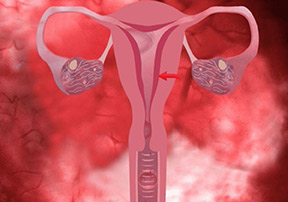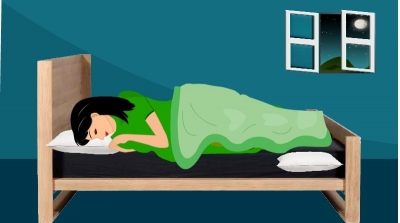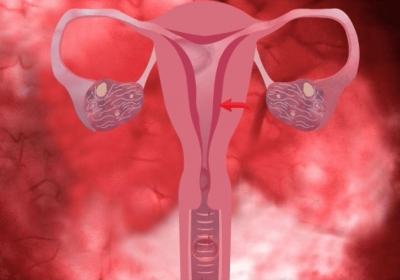While most cases of anemia are easily treated with oral iron supplements, sometimes the woman's entire volume of blood drops, and she can become severely anemic and this can lead to shortness of breath, severe fatigue and heart palpitations that may require hospitalization.
Causes of heavy bleeding
Hormone imbalance - In a normal menstrual cycle, a balance between the hormones estrogen and progesterone regulates the buildup of the lining of the uterus (endometrium). This lining is shed every month during menstruation. If a hormone imbalance occurs, the endometrium develops in excess, it is thickened and this while shedding can cause heavy menstrual bleeding.A number of conditions can cause hormone imbalances, including polycystic ovary syndrome (PCOS), obesity, insulin resistance and thyroid problems.
Dysfunction of the ovaries - Every month the ovaries release an egg during ovulation, i.e around 15 days after your first day of your menstrual period. If ovaries don't release an egg during a menstrual cycle (anovulation), your body doesn't produce the hormone progesterone, as it would during a normal menstrual cycle. This leads to hormone imbalance and may result in heavy menstrual bleeding or mennorragia
Uterine fibroids - These noncancerous (benign) tumors of the uterus appear during your childbearing years. Uterine fibroids may cause heavier than normal or prolonged menstrual bleeding.
Polyps - Small, benign growths on the lining of the uterus (uterine polyps) may cause heavy or prolonged menstrual bleeding.
Adenomyosis - This condition occurs when glands from the endometrium become embedded in the uterine muscle, often causing heavy bleeding and painful periods.
Intrauterine device (IUD) - Heavy bleeding can be a side effect of some nonhormonal intrauterine device for birth control.
Pregnancy complications - A single, heavy, late period may be due to a miscarriage. Another cause of heavy bleeding during pregnancy includes an unusual location of the placenta, such as a low-lying placenta or placenta previa.
Cancer - Uterine cancer and cervical cancer can cause excessive menstrual bleeding, especially if you are postmenopausal or have had an abnormal Pap test in the past.
Inherited bleeding disorders - Some bleeding disorders can cause abnormal menstrual bleeding.
Treatment options - Some methods to reduce bleeding include -
Ice packs - Put an ice pack on your abdomen for 20 minutes at a time, several times a day when bleeding is especially heavy.
Iron and Vitamin C supplements - Some research suggests low iron levels can increase menstrual bleeding, and that supplementing with the mineral can reduce menstrual bleeding
Medical Options
Medical options to control bleeding include -
Nonsteroidal anti-inflammatories - These drugs, which include ibuprofen or NSAIDs like diclofenac or mefenamic acid, work by reducing levels of prostaglandins, hormone-like chemicals that interfere with blood clotting. This, in turn, reduces the bleeding.
Oral contraceptives - Oral contraceptives can reduce menstrual bleeding up to 60 percent by preventing ovulation and thinning the endometrium. It may help reduce bleeding in women who choose to use oral contraceptives for contraception and who do not have risk factors that make hormonal birth control use inadvisable.
Progestin - Progestin is the most-prescribed medication for menorrhagia, with studies finding that it can reduce bleeding up to 15 percent. Progestins work by reducing the effects of estrogen in your body, slowing growth of the uterine lining. But side effects, including weight gain, headaches, swelling and depression.
Intrauterine device (IUD) - The levonorgestrel intrauterine system (Mirena) to treat heavy menstrual bleeding in women who use intrauterine contraception as their method of birth control prevention. It is recommended for women who have already had a child. The Mirena system may be kept in place for up to five years. Over this time, it slowly releases a low dose of the progestin hormone levonorgestrel into the uterus. Mirena is also referred to as an intrauterine device or IUD. The main side effect associated with Mirena can be some light bleeding between periods, particularly in the first three months of use.
Always check with your doctor before taking any medication
Surgical Options
Hysterectomy - Seventy-five to 80 percent of women with heavy menstrual bleeding do not need a hysterectomy, yet many women still opt for this surgical procedure, which is frequently recommended as a treatment option.. While very effective in ending uterine bleeding (without a uterus, your periods stop), hysterectomy is a major surgical procedure that requires hospitalization and weeks of recuperation. Additionally, hysterectomy is associated with a number of complications, with infection being the most common. Other, less invasive surgical options are:
Endometrial ablation - In this minimally invasive procedure, the lining of the uterus is destroyed via freezing, electricity, microwaves, radiofrequency (radio waves) or hot water. Ablation is performed on an outpatient basis or in a doctor's office with mild anesthetic and has a very quick recovery. It enables a woman to keep her uterus and, in many instances, may halt her periods altogether. Other surgical procedures, including myomectomy, are recommended if fibroids are the cause of the bleeding.
[quix id='8' name='About our Pregnancy Blogs and Videos']






